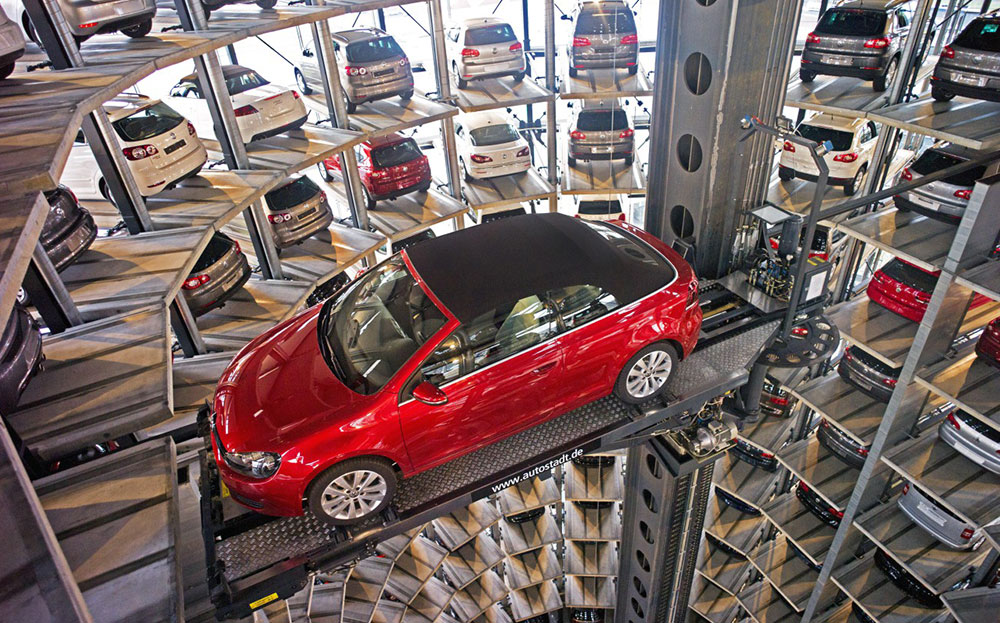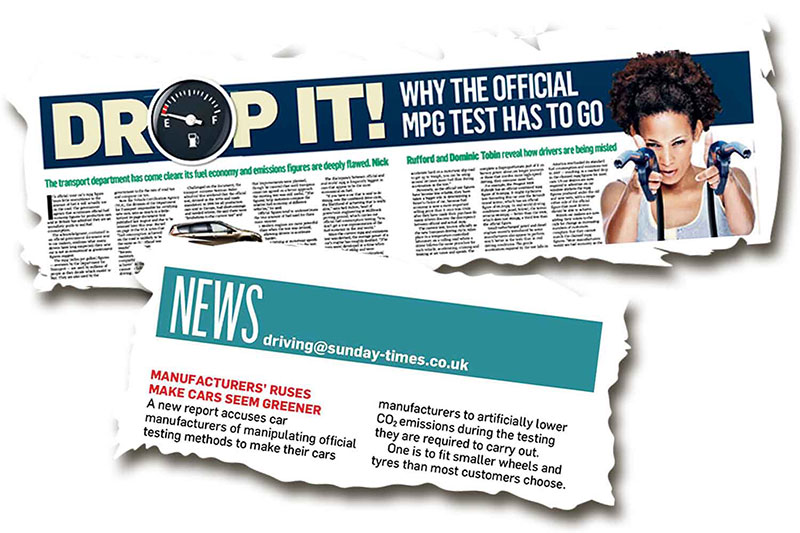Volkswagen emissions scandal: guess who'll pick up the bill for fixes
At least £500 likely to be added to new cars

The emissions scandal is giving Brussels the chance to force manufacturers into tighter pollution tests. There’s one downside: they are expected to add at least £500 to the cost of a new car. Joseph Dunn, Nick Rufford and Dominic Tobin report.
DRIVERS FACE paying hundreds of pounds extra for new cars as the costs of tough environmental controls ushered in after the VW emissions scandal are passed on to customers.
After years of wrangling over emissions levels, car manufacturers now privately acknowledge that they are entering a new era in which regulators in Europe and the US will hold sway over the traditionally powerful automobile industry.
As the scale of the VW scandal became clear, MEPs voted on Wednesday for a new real-world driving test that measures emissions outside the laboratory to be introduced earlier than had previously been planned. They also demanded that all new cars be fitted with dashboard readouts to tell motorists how to drive more efficiently.
Click to read car REVIEWS or search NEW or USED cars for sale on driving.co.uk
The European Commission is set to push through new regulations far sooner than previously planned in an attempt to salvage the reputation of its emissions testing procedures. Car makers had previously resisted such attempts, but the VW scandal has allowed regulators to seize the initiative.
Bas Eickhout, a Dutch MEP, asked the European parliament last week: “Can we now have a very quick result in those tests? Can we now stop listening to the car industry and can we just make sure that the new world driving tests are implemented immediately without any conformity factor that the car industry is asking for?”
The rule changes could also force car makers to speed up the introduction of clean new models, including petrol-electric hybrids and pure electrics. Audi, Porsche and BMW unveiled electric vehicles at the Frankfurt motor show earlier this month and at least one manufacturer is saying that production could be brought forward. “If the regulatory environment changes, then we will be forced to respond,” said a senior source at one German car company.
Car makers claim it already costs them on average €100m for every 1g/km reduction in CO2 emissions. They will need to reduce emissions still further by tens of g/km to comply with stricter targets under new tests. The cost of complying with these tests will be billions of pounds — a cost that will inevitably mean higher prices for drivers.
“The new rules and regulations are likely to add at least £500 to the cost of each new car,” said one senior car industry figure. “And those new rules are going to be brought in a lot sooner than expected.”
“The new rules and regulations are likely to add at least £500 to the cost of each new car,” said one senior car industry figure. “And those new rules are going to be brought in a lot sooner than expected”
The current emissions test has been known for years to be flawed. The Sunday Times Driving section revealed as long ago as 2012 that manufacturers were habitually “gaming” the system by taping up cracks, overinflating tyres to reduce their rolling resistance and even fitting smaller wheels.
When engines are tested for emissions, a high-grade oil and higher-quality engine components are sometimes used to reduce friction.
Also read: CAR MAKERS TRY TO STALL TOUGHER REAL-WORLD EMISSIONS TESTS DEMANDED BY EUROPE
VW is accused of going one step further and fitting a device that senses when the car is on a rolling road in order to pass American pollution tests: one of the main giveaways is that the steering wheel is not being turned. When the car is being tested, its emissions are reduced.
There is evidence that other manufacturers may be findings ways around the equivalent tests in Europe, while stopping short of outright cheating. The Sunday Times revealed earlier this year that some cars on Britain’s roads emit pollutants at up to 12 times the levels permitted by regulations.
Among the worst nitrogen oxide and dioxide (NOX) polluters were cars made by Land Rover, Vauxhall and Kia. In America Volkswagen’s diesel engine was found to breach emissions limits by up to 35 times.

European officials have been working for years to introduce a real-world test that would force manufacturers to make cars that perform as well on the road as they do in the lab, making fuel economy and emissions figures more representative. The so-called Real Driving Emissions test will measure average emissions on real, public roads; the levels must not exceed those recorded in the lab by more than a certain amount.
They have been negotiating with car makers on when to introduce the tests. The industry has argued for a long introductory period — from 2017, with a generous emissions target that firms would find easier to hit. Only in 2020 would the limits be tightened up. That argument appears to be lost now, and it is likely that an “on road” test to determine how well a car complies in real-world conditions could be introduced as early as next year.
“Regulators will have a very strong hand right now — it has suddenly become very hard for car makers to argue against the proposals,” said Konstantinos Chalvatzis, a senior lecturer in business and climate change at the University of East Anglia. “Lawmakers will certainly use the VW scandal to their advantage.”
Under the new Worldwide Harmonised Light Vehicles Test Procedure, due in 2017, vehicles will be required to cover a distance of more than 14 miles on a rolling road, rather than the existing 6.8 miles. They will be subjected to harsher acceleration and there is a segment on “extra-high-speed driving”, up to 80mph, lasting five minutes. In the current test the car reaches a maximum of 75mph and only for seconds.
Manufacturers will find that other loopholes have been closed. They will not be able to reduce the car’s drag by taping over gaps in the bodywork, and the tests will be run with the tyres at specified pressures.
Also read: A HISTORY OF CAR INDUSTRY COCK-UPS AND COVER-UPS
An unlikely hero
John German is an unlikely giant-killer. Aged 63, he is the joint head of the American arm of a not-for-profit organisation that looks into how to reduce transport pollution. If the events of the past week are ever dramatised, he’s more likely to be played by John Hurt than Johnny Depp. But research he commissioned led to one of the biggest scandals in the car industry in recent years.

German, from Ann Arbor, Michigan, has a 1997 Honda Accord estate because he “enjoys driving and it’s got a manual gearbox”. He worked for Chrysler as a powertrain engineer, and later for Honda, before joining the International Council on Clean Transportation (ICCT), a campaign group funded by charitable foundations.
In 2013 Peter Mock, German’s ICCT counterpart in Europe, came up with the idea of measuring the emissions of diesel cars in America, to prove that clean and affordable engines based on the technology could be developed in Europe.
German commissioned West Virginia University to test a range of diesel cars.
“The contract was written around the testing of three cars,” says German. “We tried to get a Mercedes but there wasn’t one available [diesel cars are less common in America]. Volkswagen is the big maker of diesels so we chose two with different exhaust treatment technologies.” The third car was a BMW X5. They were rented for three weeks of test-driving in towns and on highways.
“We got this dawning realisation over time that this was something strange,” German says. The results showed that in some conditions emissions of nitrogen dioxide from the VWs were 35 times as high as they should have been. “We realised we had to hand our findings over to the California Air Resources Board and the Environmental Protection Agency [EPA].”
VW tried to explain away the discrepancies but the EPA refused to allow its 2016 diesel cars to go on sale until it came up with an honest account. Eventually VW confessed. German suspects the scandal could spread to other car companies.
And his thoughts on who might play him in a film? “I haven’t thought about that at all,” he says.
Read more:
Click to read car REVIEWS or search NEW or USED cars for sale on driving.co.uk




